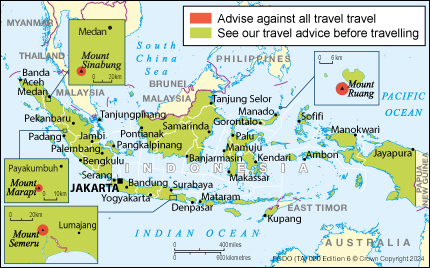
Warning
FCDO advises against all travel to parts of Indonesia.
Regional risks
This section has safety advice for regions of Indonesia. It only covers regions where FCDO has specific advice.
You should also read FCDO’s overall travel advice and safety and security advice.
Mount Ruang, Northern Sulawesi
FCDO advises against all travel to within 6km of the crater of Mount Ruang in Northern Sulawesi. This is an exclusion zone put into place by the local authorities. Mount Ruang erupted on 16 April 2024.
Mount Marapi, Western Sumatra
FCDO advises against all travel to within 3km of the crater of Mount Marapi in West Sumatra. This is an exclusion zone put into place by the local authorities. Mount Marapi erupted in December 2023.
Mount Agung, Bali
In 2018, Mount Agung in East Bali erupted, emitting gas and ash which resulted in the closure of Bali’s airport and a number of nearby regional airports for a period of time. Climbers are recommended to limit activity around the crater. The alert level is subject to change at short notice.
Travellers to Bali may find information on travel during the volcanic activity useful.
Further disruption cannot be ruled out. The local authorities have indicated that Mount Agung continues to show signs of volcanic activity and the possibility of volcanic eruptions remains.
Mount Semeru, East Java
FCDO advises against all travel to:
- within 5 km of the crater of Mount Semeru in Lumajang Regency, East Java
- the southeast area of Mount Semeru along the Besuk Kobokan river, approximately 13km from the crater, and 500m from any Besuk Kobokan riverbank
These are exclusion zones put into place by the local authorities.
Mount Semeru erupted in 2022, emitting a 1,500 meters (4,921 ft) high ash cloud. Indonesian authorities have set an alert status of level 4 (of 4) and are warning of the potential for pyroclastic flows and lava flows along rivers, tributaries and valleys around Mount Semeru, especially along Besuk Kobokan, Besuk Bang, Besuk Kembar and Besuk Sat.
Mount Sinabung, North Sumatra
FCDO advises against all travel to:
- within 5km of the crater of Mount Sinabung in Karo Regency, North Sumatra
This is an exclusion zone put into place by the local authorities. Mount Sinabung erupted in 2021, sending a large column of smoke and ash into the sky.
Aceh
Aceh has emerged from a long period of internal conflict. Although violence against foreigners is rare, a British national was abducted in 2013 and there were 3 separate incidents in 2009 targeting foreigners. There have been reports of Sharia (religious) police harassing foreigners.
Be alert to the risk of politically motivated violence. Take particular care in remote areas. Keep up to date with local developments and avoid large crowds, especially political rallies.
Sharia law is in force in Aceh. See safety and security.
Central Sulawesi Province
The political situation in Central Sulawesi Province is unsettled. Take particular care in Palu, Poso and Tentena. Be alert to the risk of politically motivated violence.
There is conflict between the Indonesian security forces and terrorists, including attacks upon police and civilians in 2021. This conflict is predominantly in the Sigi, Parigi Moutong and Poso regions.
Maluku Province
Maluku Province has experienced unrest and violence between different religious and tribal groups. Take particular care in Ambon, including Haruku Island (Pulau Haruku).
Papua
Armed Papuan separatist groups are fighting for independence from Indonesia in the region of Papua. Violence has been steadily increasing since 2018. The Indonesian government has a heavy security presence throughout the region especially in Highland Papua, Central Papua provinces and along the border with Papua New Guinea. There are regular armed clashes between Papuan separatist groups (known as the TPNPB-OPM) and government security forces, mainly in the regions of Highland Papua and Central Papua.
Clashes have resulted in civilian deaths, including foreign nationals. In 2020, a New Zealand national was shot dead and a number of Indonesian nationals were wounded in a mining facility in Highland Papua province.
In February 2023:
- a New Zealand national was kidnapped by a separatist group in Nduga, Highland Papua Province
- the TPNPB-OPM issued a statement that foreigners in the Papua region would be targeted
There have been several instances of Papuan separatists attacking commercial aircraft servicing remote communities via small local airfields, especially in Highland Papua and Central Papua provinces. This includes aircraft which are regularly used by foreign nationals and those working in the region as the only viable means of transportation.
Political tensions have also led to violent demonstrations in cities across Papua, which have turned violent at short notice. Take local advice to help you avoid possible demonstrations and political rallies. Internet communications might be switched off in areas where demonstrations are planned. Make plans in advance in case you are affected.
If you’re planning to travel in the Highland Papua and Central Papua provinces be aware that the security situation is unpredictable and can change quickly, Take local advice to understand the current tensions, and how you can reduce your personal risks.
In 2022, the Indonesian government passed new legislation to reform the governance and administration of the Papua region. The existing provinces of Papua and West Papua have been reorganised into 6 provinces, which are now known as:
- Papua
- West Papua
- Central Papua
- Highland Papua
- South Papua
- Southwest Papua
If you have travelled to the area previously make sure you check the updated map.
The UK Government has no permanent presence in the region. Consular services are delivered remotely from Jakarta. There are limited hospital facilities in the region. If you need emergency medical treatment, you are likely to be medically evacuated to Darwin in Australia.



